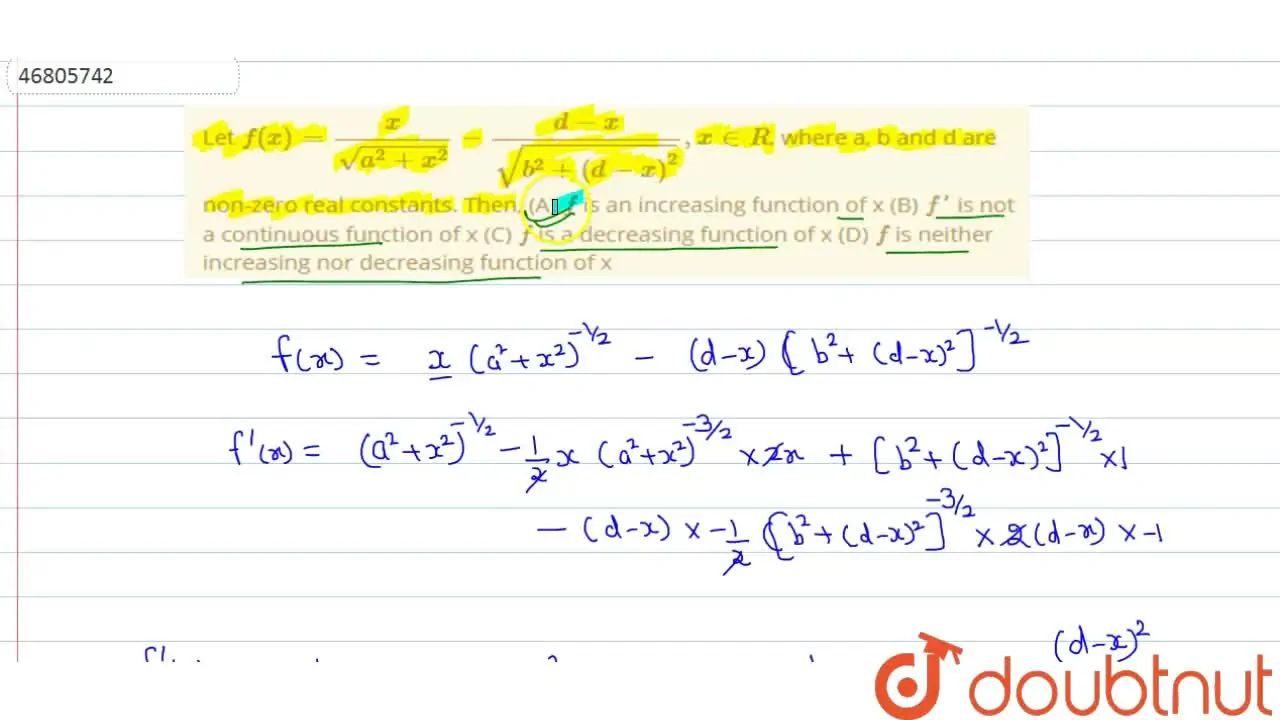Let f(x)=x√a2+x2−d−x√b2+(d−x)2,x∈R, where a, b and d are non-zero real constants. Then,
f is an increasing function of x
f' is not a continuous function of x
f is a decreasing function of x
f is neither increasing nor decreasing function of x
The correct Answer is:A
We have,
f(x)=x(a2+x2)1/2−(d−x)(b2+(d−x)2)1/2
Differentiating above w.r.t. x, we get
(a2+x2)1/2−x122x(a2+x2)1/2/((b2+(d−x2)
−b2+(d−x2)1/2(−1)−(d−x)2(d−x)(−1)2(b2+(d−x)2)1/2(b2+(d−x)2)
[by using quotient rule of derivative]
=a2+x2−x2(a2+x2)3/2+b2+(d−x)2−(d−x)2(b2+(d−x)2)3/2
=a2(a2+x2)3/2+b2(b2+(d−x)2)3/2>0,
∀x∈R
Hence, f(x) is an increasing function of x.
Related Playlists
- BOOK - IIT JEE PREVIOUS YEARCHAPTER - APPLICATION OF DERIVATIVES EXERCISE - RATE MEASURE, INCREASING AND DECREASING FUNCTIONS (OBJECTIVE QUESTIONS II)3videos
APPLICATION OF DERIVATIVES
- BOOK - IIT JEE PREVIOUS YEARCHAPTER - APPLICATION OF DERIVATIVES EXERCISE - RATE MEASURE, INCREASING AND DECREASING FUNCTIONS (FILL IN THE BLANKS )2videos
APPLICATION OF DERIVATIVES
- BOOK - IIT JEE PREVIOUS YEARCHAPTER - APPLICATION OF DERIVATIVES EXERCISE - EQUATIONS OF TANGENT AND NORMAL (INTEGER ANSWER TYPE QUESTIONS )1videos
APPLICATION OF DERIVATIVES
- BOOK - IIT JEE PREVIOUS YEARCHAPTER - 3D GeometryEXERCISE - Equation of Plane Objective Question II (Integer Answer Type Question)1videos
3D Geometry
- BOOK - IIT JEE PREVIOUS YEARCHAPTER - AREAEXERCISE - AREA USING INTEGRATION55videos
AREA
Similar Questions
Differentiate: x√a2−x2
View Solutionddx[tan−1(x−√a2−x2x+√a2−x2)]=
View Solutiond/dx⎡⎢⎣tan−1(√x2+a2+x√x2+a2−x)1/2⎤⎥⎦
View SolutionIf : f(x)=1√x2+a2+√x2+b2 then: f'(x)=
View SolutionLet f(x)=a+b|x|+c|x|2, where a,b,c are real constants. The, f'(0) exists if
View SolutionIf f(x)=x√a2+x2+(d−x)√b2+(d−x)2 ten (A) f(x) is strictly increasing (B) f(x) is strictly deceasing (C) f'(x) is constant (D) f(x) is neither increasing nor decreasing
View SolutionLet f(x)=a|x|2+b|x|+c where a,b,c are real constants. Then f'(x) exists at x=0 if:
View SolutionIf 2 + i and √5−2i are the roots of the equation (x2+ax+b)(x2+cx+d)=0, where a, b, c, dare real constants, then product of all roots of the equation is
View SolutionIf x=5+2√6, then √x2−1√2x = (a) 1 (b) 2 (c) 3 (d) 4
View SolutionLet f(x)=min{√4−x2,√1+x2}∀,x∈[−2,2] then the number of points where f(x) is non - differentiable is
View Solution


